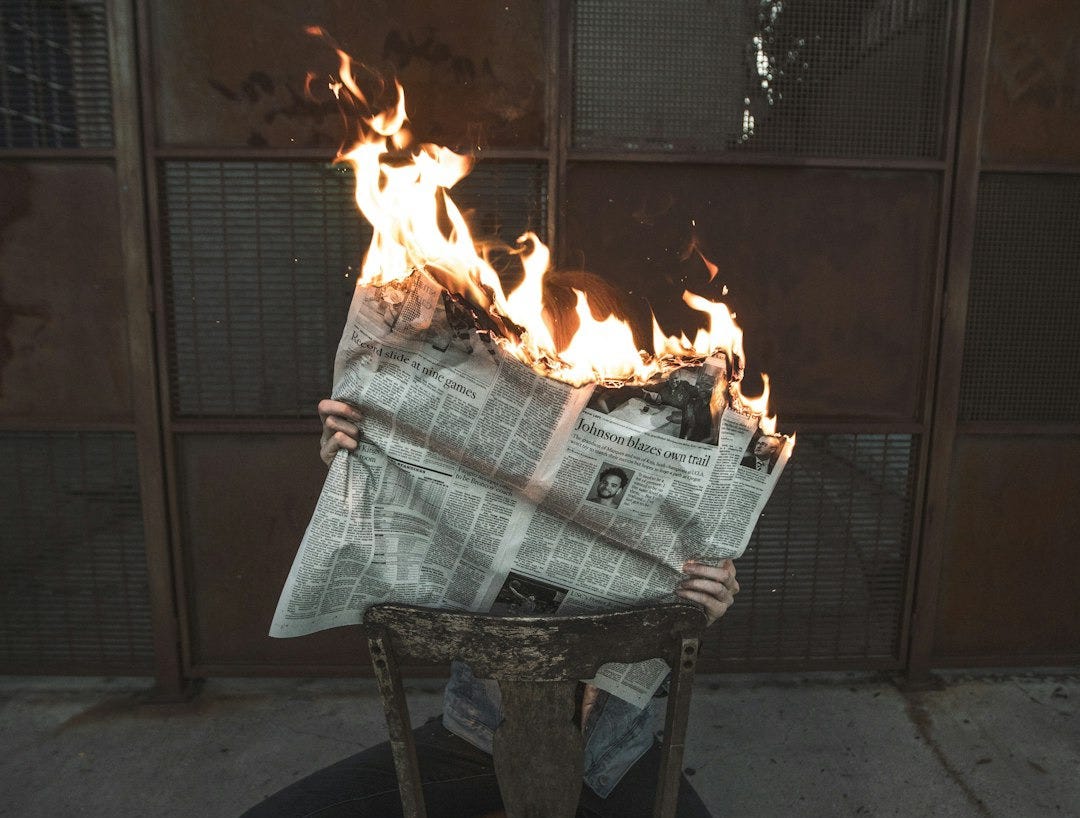It feels like a long time ago when I resigned from the LA Times. In fact, it's been all of five months, a fraction of the 15 years that I spent writing columns there.
I had no regrets then, and I have no regrets now. I watched in disgust as the owner of the paper, Dr. Patrick Soon-Shiong, strong-armed his staff into making nice to Donald Trump. The insistence on “more balanced” coverage had absolutely nothing to do with journalistic ethics or objective reporting.
Moreover, like other social institutions critical to democracy, the Trump presidency has brought on an existential crisis for media. Just this week, CBS News CEO Wendy McMahon resigned, following on the heels of the resignation of 60 Minutes’ executive producer Bill Owens. Both executives left in apparent protest over the network’s agreement to negotiations to settle a joke of a lawsuit brought by Trump. The acquiescence had nothing to do with the merits of the suit – there are none – but with the illegal bully-boy pressure from Trump’s lackey at the FCC holding up a valuable merger for Paramount, CBS’s parent company.
The last five months have only intensified, significantly, the importance of taking a stand against the groveling of major media like the LA Times, CBS, and The Washington Post. As I wrote at the time, “the neutral posture that Soon-Shiong uses to justify his violence to the paper is exactly, fundamentally wrong. This is no time for neutrality and disinterest. It’s rather a time for choosing. And a choice for true facts and American values is necessarily a vigorous choice against Donald Trump.”
Since I left the Times, things have become positively miserable in the newsroom of the once-great paper. Dr. Soon-Shiong, whom it could kindly be said knows nothing about traditional journalism, has become personally involved in forcing his policy of currying favor down his staff’s throats. He has spiked editorials he saw as negative to Trump and insisted on personally clearing every op-ed headline about the President. Even apart from helping to enable the greatest threat to First Amendment freedoms since at least the Red Scare, Soon-Shiong has treated his professional staff with staggering disrespect.
In my resignation announcement, I wrote that “[m]y editors [at the Times] have been skilled, quick, and fair. I have been able to write whatever I like, including blistering criticism of Donald Trump.” That’s completely true. And it goes in spades for my chief editor there, Josh Gohlke. As an editor, he was nearly flawless, with a deft touch for making a claim stronger and more precise, without losing sight of the core argument. That’s probably because he has also been a writer for many years. And when the situation at the Times started to go downhill and I was thinking of resigning, he was a completely fair arbiter between my concerns and the paper’s needs.
You may not be surprised at what's coming next. After hanging in there as long as he could and watching the editorial page become bowdlerized and his colleagues treated unprofessionally, Josh submitted his own resignation. It was a far bigger sacrifice than mine: the Times was just one of many professional projects for me, but for him it was his full-time job—not to mention the source of benefits for his wife and young kid.
It's of course an enormous loss for the Times. And it’s one more example of the terrible brain drain happening across major institutions—media, academia, government—as a result of Trump’s tyrannical ambitions.
Given his experience and reputation, Josh will probably land at another major publication soon. For now, though, he’s done what journalists who resign in principle do: started a Substack. Yesterday he published his own explanation for his decision to walk away from an intolerable situation at the Times: “I was an L.A. Times opinion editor. Here’s why I’m not anymore.” With his permission, we are reprinting it below.
And if you like the piece, subscribe to Josh’s new Substack. It will be top-notch and interesting. Plus, you can think of it as support for independence and credibility in media, the values that provoked Josh—and me—to walk.
Talk to you later.
I was an L.A. Times opinion editor. Here's why I'm not anymore
Owner Patrick Soon-Shiong is ingratiating himself with the Trump administration at the expense of the newspaper's independence and credibility.
By Josh Gohlke
Dating from my first failed interview, it took me about a decade to get a job at the Los Angeles Times. “That’s the top of the heap!” an old colleague said when I was finally hired. Indeed, in the context of my career and those of many other journalists, the Times could fairly be called the pinnacle. And now, just two years later, I’ve jumped off.
This wasn’t out of an idiosyncratic impulse to end my long legacy media career and start one of Substack’s most obscure newsletters. Rather, I joined an exodus of journalists, subscribers and dollars from the West’s largest news organization since the eve of the 2024 election.
That was when Patrick Soon-Shiong, the pharmaceutical billionaire who had been the Times’ relatively retiring owner since 2018, appeared to come down with a case of sudden-onset Trump derangement syndrome. As one of the Times’ opinion editors, I was high on the list of people who became incompatible with his newly acquired determination to make the newspaper Republican again.

With Jeff Bezos’ Washington Post, major television networks and Silicon Valley platforms also rushing to reflect the reactionary politics of the moment, Soon-Shiong may not be the most infamous of the media and tech titans making a spectacle of their servile devotion to the new administration. But he has been second to none in his embarrassing eagerness to abase himself before the even richer and more powerful – right down to publicly ogling Robert F. Kennedy Jr.’s creepy exercise videos – at the expense of the institution he is supposed to lead.
Leadership, as it happens, was the subject of the last of thousands of editorials and columns I wrote for scores of newspapers over the course of my career – and, thanks to Soon-Shiong’s personal intervention, one of about two that weren’t published. In retrospect, I can see why it was a sensitive subject for someone so overmatched by the responsibilities he took on.
I wrote the doomed piece about a month after Soon-Shiong killed the editorial board’s endorsement of Vice President Kamala Harris – a position that every person with a passing familiarity with the newspaper, apart from its owner, was thoroughly prepared for. The Times’ editorials editor resigned as a result, and I had the dubious honor of being dragooned into serving as her interim successor. As one writer responded to the news of my reassignment from the other half of the opinion department, “lol. Congrats … I guess.”
Pseudoscientific notions
My own spiked editorial, especially after it endured more anticipatory editing than just about anything I’ve written in decades, was not a remarkably controversial example of the form. It simply recognized that several of then-President-elect Donald Trump’s choices to lead the federal government, including Kennedy, were not remotely qualified to do so, making it especially desirable that the U.S. Senate do its constitutional due diligence in considering them – something Trump was then suggesting it shouldn’t.
Standard editorial board fare? Not to someone as perpetually surprised by the workings of journalism as Soon-Shiong, who for the second time in as many months took the extraordinary step of personally murdering an editorial at the eleventh hour. It was such an overreaction that you might think I had advocated something as outlandish as putting an erratic anti-vaccination conspiracy theorist atop the nation’s public health bureaucracy. (That could be because some of Soon-Shiong’s other, more lucrative business ventures rely on the mercies of that bureaucracy no matter how sideways it goes.)
The owner did claim my editorial could be published as soon as we commissioned a counterpoint to run simultaneously – which, besides not being how any of this works, typifies the pseudoscientific notion of “balance” that is his preferred paper-thin guise for normalizing the incompetence and extremism of Trump and company. Given that the opposite view would be that Cabinet members and senators need not be equal to their jobs, it’s not surprising that no such piece ever materialized.
I asked at that point to be excused from the editorial board and returned to the op-ed team, where I hoped to continue to do my job without interference. After all, while newspaper publishers have long had some legitimate role in institutional editorial board positions – albeit usually a more orderly one – it was harder to imagine the owner’s meddling extending to the individual views of the Times’ op-ed columnists and contributors.
And yet over the ensuing months, it became clear that Soon-Shiong’s fragile political sensibilities couldn’t even consistently bear contradiction by a single contributor. So he graduated from insisting on personally clearing every op-ed headline – which is one way to ensure that none is so interesting as to cause anyone to read the accompanying article – to increasingly intrusive microengineering of the Times’ broader opinion journalism.
Willful perplexity
Soon-Shiong in that time caused more than one op-ed to be published in circumvention of the opinion editors and the newspaper’s basic standards. One disingenuously cast Kennedy as an iconoclastic hero for “everyday moms” while falsely suggesting that the scientifically unsupported lab leak “theory” of COVID-19’s origins had been all but proven. Another, published under the headline “Make Los Angeles great again” – I use the term “headline” loosely to describe a warmed-over political slogan – bore the pseudonymous byline “Peachy Keenan.” That’s not just silly; it’s in direct violation of the Times’ ethics guidelines, which read in relevant part, “We do not use pseudonyms.”
Meanwhile, veteran columnists whose views don’t comport with the owner’s were urged to halve their output – the first time in my career that I have seen journalists encouraged to produce less. Moreover, what’s left of their work and the rest of the Times’ opinion journalism was buried amid sports columns and restaurant reviews, all of which were opaquely rebranded as “Voices.” And in not the worst but probably the most absurd of these incursions, an artificial intelligence application aptly named Perplexity was deployed to detect the bias of the Times’ overtly biased opinion content, which is something like using a metal detector to locate a battleship.
Ensuing events have only made such corporate encroachments on journalistic independence look even more lamentable, wrongheaded and ridiculous. Soon-Shiong and his ilk have done incalculable damage to their institutions’ credibility and viability in the service of a president who has already proven disastrous to the nation’s freedom, power, prosperity and security – and has the unprecedentedly dismal approval ratings to prove it.
Just as I once vainly hoped that Soon-Shiong’s anti-journalistic rampage might end with the editorial board, some at the Times appear to be calculating that the opinion department – which has lost about two-thirds of its highly capable staff since I joined it – is the Sudetenland that can be surrendered to save the news side. I have my hard-earned doubts. Soon-Shiong’s record doesn’t just suggest he understands less about media than I do about biotechnology; it shows his crass inclination to ingratiate himself with the regime knows none of the ethical bounds on which journalism depends.









Josh Gohlke: I also would like to pledge money but, as others here, I am oversubscribed and find my days filled with working in the daily tasks between Substacks. It's exhausting. I have had to drop subscriptions sheerly from lack of time and stamina (at 77). But - I want to encourage you and when I can find a balance that saves me the contributors I want to make time for because I trust them, I expect you will make that cut. Because, if Harry recommends you, that's the highest possible praise in my book. I am certain to "like" and "restack" you. Kudos for your integrity to stand up for truth. Invaluable in the day of kowtowing cowardice.
I would like to support you by subscribing but I am over-subscribed as it is, and broke from it and donations. Could you maybe take (paid) part of another subscription? I still subscribe to the NYT and Guardian in addition to Substacks. I am sick at heart and mind about the cancer of private equity/billionaires in so many places. My county (Ouray County, Colorado) has a wonderful weekly paper that covers local issues and is very independent. The Colorado Sun (online) is very independent and covers issues besides Denver. I don't have TV (nothing I wanted on it when I lost interest bin the Red Sox). As an aside, I worked at WGBH-TV in Boston from 1973-1980 at the Captioned ABC News for the Hearing-Impaired" when it was a pilot project for captioned news. I saw in our transcriptions form the editing into captions how little information there was in TV news even then- the best TV news is not visual. A tornado, while visual, is not informative. The Watergate hearings, while very informative, had nothing to show. For seven years, I edited web transcripts for FRONTLINE from home(while workings an RN to make a living). I worship and carefully assess real journalism.
I wish you the best.
Ilene Bilenky. Reg. Independent, Retired RN, MPH, US Army Reserves medical officer
Ridgway, CO 81432